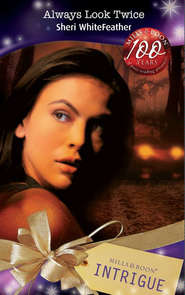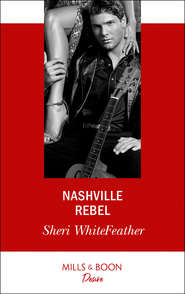По всем вопросам обращайтесь на: info@litportal.ru
(©) 2003-2025.
✖
Paper Wedding, Best-Friend Bride
Автор
Год написания книги
2019
Настройки чтения
Размер шрифта
Высота строк
Поля
“Yes, if only.” She’d caught glimpses of the capital city yesterday and had seen how poverty-stricken some of the areas were, the places where the kids from the orphanage had come from. And if anyone could relate to their ravaged beginnings, it was Max. He’d been born in South Dakota on one of the poorest reservations in the States, before his mother had hauled him off to an impoverished Los Angeles neighborhood.
As lonely as Lizzie’s childhood had been, she’d never known the pain and fear of being poor. But that hadn’t stopped her and Max from becoming friends. They’d formed a bond, regardless of how different they’d been from each other.
Trapped in emotion, she said, “Thank you.”
He gave her a perplexed look. “For what?”
For everything, she thought. But she said, “For inviting me to take this trip with you.”
“I’m glad you’re here, too.”
Their gazes met and held, but only for a moment.
Returning to their food, they fell silent, fighting the ever-present attraction neither of them wanted to feel.
* * *
Max and Lizzie got to the mainland around eleven, and he hailed a cab. Taxis weren’t metered here, so they had to agree on the price of the fare before departure. Max arranged to keep the taxi at their disposal for the rest of the day. Their driver was a big, broad-shouldered twentysomething with a brilliant smile. As pleasant and accommodating as he was, he drove a bit too fast. But tons of cabbies in the States did that, too. As for the car, it was old and rickety, with seat belts that kept coming unbuckled. But it was better than no transportation at all, Max thought.
As they entered the shopping district, the car bumped and jittered along roughly paved roads. The still-smiling cabbie found a centrally located parking spot and told them he would wait there for them. To keep himself occupied, he reached for his phone. Max, of course, was consumed with technology, too. It was his world, his livelihood, his outlet. But he never buried his face in his phone when he was with Lizzie. She hated it when people ignored each other in favor of their devices, so he’d made a conscious effort not to do that to her.
Behaving like tourists, they wandered the streets, going in and out of small shops. Some of the vendors were aggressive, trying as they might to peddle their wares. But Max didn’t mind. He understood that they had families to feed. He went ahead and purchased a bunch of stuff to ship back home, mostly toys and trinkets for his nieces—his foster brothers’ adorable little daughters.
Lizzie wasn’t faring as well. Although she’d already gotten a stack of baby goods for the infants and toddlers at the orphanage and placed them in the taxi for safekeeping, she couldn’t make up her mind about the rest of the kids.
Finally she said, “Maybe I can put together a big box of art supplies that all of them can use.”
“That’s a great idea. Tokoni would appreciate it, too, since he loves to draw. There’s an arts and crafts store around the corner. They also have a little gallery where they sell works by local artists. I always wanted to check it out.”
“Then let’s go.” She seemed interested in the art, too. “But first I want to get what I need for the kids.”
They walked to their destination. The sun was shining, glinting beautifully off her ponytailed hair. He’d teased her earlier about her looking like a socialite who was trying to go incognito. In his opinion, Lizzie wasn’t the type who could downplay her breeding. She’d already spent too many years perfecting it, and by now it was ingrained into the woman she’d become.
When they came to the arts and crafts store, they went inside, and she gathered paints, brushes, crayons, markers, colored pencils, paper, blank canvases and whatever else she could find. She added crafts, too, like jewelry-making kits and model cars. The man who owned the shop was thrilled. He was a chatty old guy who introduced himself as George. Max figured it was the English translation of his birth name.
After Lizzie made her purchases, she and Max browsed the work that was for sale in the gallery section. George followed them. Hoping, no doubt, that Lizzie was an art collector.
Only it was Max who got curious about a painting. It depicted a ceremony of some sort, where a young couple was cutting pieces of each other’s hair with decorative knives. In Native American and First Nations cultures, shearing one’s hair was sometimes associated with death and mourning. But the people in this picture didn’t appear to be grieving.
While he inspected the painting, Lizzie stood beside him. George was nearby, as well.
“What are they doing?” Max asked him.
The owner stepped forward. “Preparing for their wedding. It’s an old custom, chopping a betrothed’s hair. Doing this symbolizes their transitions into adulthood.”
Max frowned. “I’d never do that.”
“Do what? Cut your lady’s hair?” By now George was gazing at Lizzie’s bright red locks.
“I meant get married.” Max shook his head. “And she isn’t my lady. She’s my friend.”
“Hmm.” George tapped his chin. “Is this true?” he asked Lizzie. “You’re only friends with this man?”
“Yes, that’s all we are,” she assured him.
“It’s different for me,” he said. “I have a wife.” He took her hand and tugged her toward the other side of the gallery. “You come, too,” he told Max. “I’ll show you something else.”
As soon as Max spotted the painting George wanted them to see, he stopped to stare at it. The nearly life-size image depicted a wildly primitive young woman on a moonlit beach, dancing with a male partner, only he was made completely of fire. She swayed in his burning-hot arms, with her long slim body draped in a sparkling gold dress. Her flame-red hair blew across her face, shielding her mysterious features from view.
“It’s called Lady Ari,” George said.
Max sucked in his breath. “After the royal goddess of fire.” He hadn’t known her name until now.
“Yes,” George said. “With hair like your friend’s.” He glanced over at Lizzie.
Max shifted his attention to her, too, but she didn’t acknowledge him. She continued looking at the painting. Was she as captivated by it as he was, or was she focusing on the picture so she didn’t have to return his gaze?
He couldn’t be sure. But the feverish feeling Lady Ari gave him was too overpowering to ignore. “I’m going to buy it.” Now, he thought, today.
With a sudden jolt, Lizzie jerked her head toward his. “And do what with it?”
“I’ll hang it in my house.” He considered where to put it. “Above the fireplace in my den.”
“You already have a nice piece of artwork there.”
“So I’ll replace it with this one.”
She fussed with her ponytail, as if she was fighting its brazen color, and he realized how uncomfortable his attraction to Lady Ari was making her. But he simply couldn’t let the painting go.
As they both fell silent, Max noticed that George was watching the two of them, probably thinking what strange friends they were. But nonetheless, the older man was obviously pleased that he’d just made a significant sale.
“The artist would be enchanted by you,” George told Lizzie. “You would be charmed by him, too. He’s young and handsome.” He then said to Max, “A lot like you.”
Lizzie raised her eyebrows at that, and Max shrugged, as if the artist’s virility was of no consequence. But it made him feel funny inside, with George making what seemed like romantic comparisons.
Still, it didn’t change his interest in buying it. The need to have it was too strong. Max arranged to have the painting shipped home, as he’d done with the items he’d bought for his nieces.
After the transaction was complete, they said goodbye to George and returned to their taxi, piling the art supplies Lizzie had purchased into the trunk.
She scowled at Max and said, “I still have to get Losa a rose.”
“Okay, but don’t be mad about the painting.”
“I’m not.”
Yes, she was, he thought. She didn’t like the idea of him owning a picture that could be mistaken for an untamed version of her. But he wasn’t going to apologize for buying something he wanted.
“Do you know where the florist is?” she asked him.











